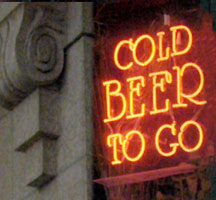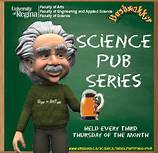Sciene Pub - Double Feature
October 19, 5:30 PM, Bushwakker
Oct. 19-20: SCIENCE PUB – DOUBLE FEATURE. Our wildly popular Science Pub Series returns for a fifth incredible season and is bigger and better than ever with two special presentations in October! Enjoy lectures on scientific topics of general interest in our Arizona Room (main floor banquet room) over beer and snacks. The room opens at 5:00 PM and quite often is full by 6:00 PM. Avoid disappointment and come down early for dinner and a pint before the presentation which begins at 7:00 PM.
Oct. 19 – NIGHT ONE: NUCLEAR SCIENCE WEEK - SO JUST HOW DANGEROUS IS LOW DOSE RADIATION? Presented by Nicholas Priest from Chalk River Laboratory, Canadian Nuclear Laboratories. It is well established that the general public fears nuclear radiation and that it hugely overestimates the toxicity of what, in reality, is a rather weak carcinogen. Studies by the Royal Society and others have described this level of risk perception to be a function of two main factors: uncertainty concerning the effects of radiation, and dread of the consequences of irradiation (cancer and genetic damage). The situation is not helped by the radiological protection community that insists on using cancer mortality as its only outcome measure. This is so even though exposure to low dose radiation influences the prevalence of other diseases and that overall there is no convincing evidence of reduced life-span following the receipt of acute doses of external radiation up to 100 mGy. Moreover, at low doses the induction of adaptive responses to a stressor (radiation) may extend life. To change perceptions it is necessary both to address these factors and to explain why people are not similarly afraid of exposures to natural environmental and medical radiation. Sufficient evidence exists to allay the fear of radiation exposure, but the path forward to put to rest the apprehensions of the population is unclear.
Oct. 20 – NIGHT TWO: INVOKING THE WONDERS OF SCIENCE: A Way Forward in Upholding the United Nations Convention on the Rights of Persons with Disabilities. Presented by Vianne Timmons, President and Vice-Chancellor, University of Regina. Since the Convention on the Rights of Persons with Disabilities was adopted by the United Nations in 2006, a great deal of effort has been spent – with varying degrees of success – at having the nations of the world sign and ratify it. A decade on, however, it is time to shift focus from ratifying the Convention to meaningfully upholding it. As we look for ways to make this shift, the application of science provides tremendous opportunities to help persons with disabilities participate and be viewed as full and equal members in a global society.
http://www.bushwakker.com/
https://www.facebook.com/TheBushwakker
2206 Dewdney Avenue
S4R 1H3
Local Number: 306-359-7276











